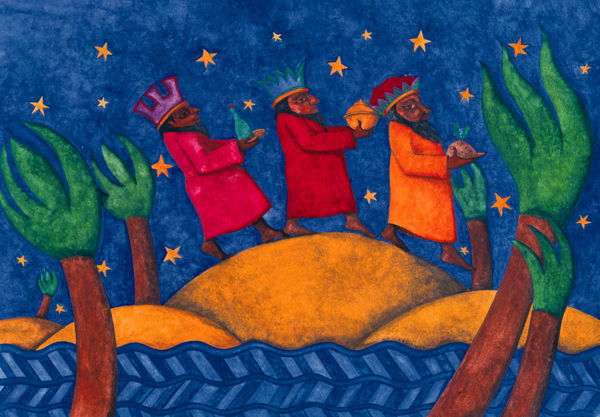TRAFFIC SIGNS ON THE MAGI’S ROUTE
- Charles
- 7 janv. 2023
- 4 min de lecture
Reflections on the Epiphany of the Lord
(Mass Readings: Isaiah 60:1-6, Ephesians 3:2-3a, 5-6, Matthew 2:1-12)

Who were these mystery men from the East? Centuries of speculations and research passed down in tradition have generated vastly varying portraits of the magi: astrologers, sorcerers, kings, pilgrims, magicians, Zoroastrian priests, philosophers, counsellors to Babylonian and Persian emperors, etc., Luke, who is a bit of a history buff, does not mention them in his infancy narrative. Matthew refers to them as magoi (μάγοι-Gk) and nowhere does he claim that they were three! This aura of anonymity around the historicity or identity of the magi shifts our focus to the meaning of their collective quest. This Sunday, as we celebrate their memorable journey, we reflect on three road signs that determined their pilgrimage to Bethlehem.

1. Narrow road ahead: The magi’s journey must have been anything but a pleasant trip! If they did start from Babylon as biblical scholars suggest, they must have covered over 1200 kms travelling on the same path as Abraham and the Jewish exiles. We can only imagine the challenges of a strenuous and expensive journey on camelbacks in the middle of a freezing winter with no map, GPS, or even a destination address. Their route lay outside the borders of the Roman empire and therefore prone to bad roads and attacks by robbers. Despite these challenges, they set out “to strive, to seek, to find, and not to yield” (Ulysses, Tennyson), guided by a star and the writings of little-known Hebrew prophets.
The road to discipleship is never easy. Netherlands-based International Institute for Religious Freedom (IRF) reports that over 36 crore Christians (that is one out of seven) endured some sort of persecution and discrimination in the year 2021. 5898 Christians were killed (up by 23.8 % since 2020), 5110 churches were attacked (up 13.8 %), 6175 were sentenced without trial (up 44.3%), and 3829 were kidnapped (up 123.9%). Much like the magi’s path, the road to Christ’s epiphany continues to pose challenges and inconveniences. As this road gets narrower year by year, we face the task of persevering on the narrow and risky path to God’s permanent epiphany, nourished by the Word and guided by the light of the star of faith. Wise men and women still seek Him.

2. Take Diversion: Why would the magifirst come to Jerusalem? Well, their quest was to find and pay homage to the newborn king of the Jews. Where else would one find the king but in the capital city? Jerusalem, the religious, political, military, economic, and cultural ‘centre’ of the kingdom, only seems the natural and logical choice of their destination. However, the logic of Epiphany dictates that the King is not to be sought in the palace. 8 kms south of Jerusalem lies an anonymous village named Bethlehem, home not to kings or nobles but to peasants and shepherds. The star rests not over the palace of Jerusalem, but over a stable in Bethlehem.
The magi’s diversion from Jerusalem to Bethlehem is one that we have to personalise in our lives. Epiphany teaches us that our search for God’s epiphany should take us to where He really is and not where we expect to find Him. The magi found God in an unexpected place amidst unexpected people. The challenge of Epiphany is to discover God’s presence outside our traditional pilgrimage sites: in the margins of our society, well beyond the boundaries of caste, language, region, ethnicity, identities, and affiliations. ‘God is with us’ but in places that we don’t normally prioritise for our pilgrimages! Take diversion!

3. U-Turn: Warned in a dream not to return to Herod, the magi “departed for their country by another way”. The Greek term μετάνοια (metanoia) for repentance literally means “to turn and go another way”. The experience of epiphany, in a way, leads the magi to repentance. In a deeply allegorical poem “Journey of the Magi”,T.S. Eliot recounts a question posed by the magi: “Were we led all that way for Birth or Death?” He replies, “There was birth, certainly… but this birth was hard and bigger agony for us, like Death. We returned to our places, these kingdoms. But no longer at ease here”.
How could epiphany be an experience of death to the magi? God’s manifestation challenges us to acknowledge the death of our past world and to experience the birth of another. The pain and perils of the U-turn liberate the magi of their old selves and prepare them for something radically new. The homage (worship/adoration) that the magi paid to the incarnate Word did not end at the crib. They continue to live the true meaning of ‘worship’ in their renewal through the path of conversion. On this feast of Epiphany, let us pay careful attention to the road signs in our personal and collective trip to God’s epiphanies. Let us enter the narrow roads ahead, take the diversion towards the margins and resolve to U-turn to a renewed life. Happy journey!




Commentaires